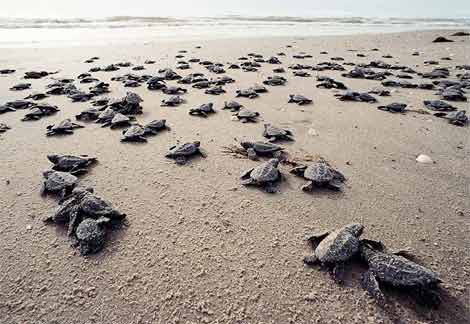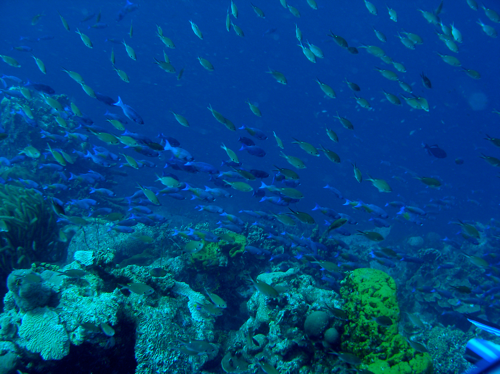Many scientists are concerned about the effects of a rising sea level on organisms of all shapes and sizes. Humans, of course, are at risk of having our coastal cities flooded. Additionally, many marine and coastal organisms will feel the effects of rising sea level.
Changes in sea level are due to the effects caused by rising temperature. As the oceans get hotter, water expands. As terrestrial ice melts, it flows into the seas, raising the sea level.
Sea turtles

- Rising sea levels will disturb sea turtle nesting grounds. Sea turtles will likely respond to habitat loss by moving inland as the coast moves inland.
- The following paper by Fuentes, Limpus, and Hamann, available with access to Galileo, uses sea turtles as a model to show the importance of looking at multiple effects of climate change on an organism in order to predict how it will react to changes in the environment. In this case, one of them is rising sea level.
- Vulnerability of sea turtle nesting grounds to climate change
Coral

- Coral reefs are sensitive marine ecosystems. Species of coral are adapted to live at specific depths depending on how much light they need from the sun. As sea levels rise, coral living at greater depths will receive less sunlight and will be forced to move, adapt, acclimate, or die.
- The following article from Duke University explores the effects of rising sea level on coral reefs.
- Coral Reefs & Sea Level Rise
Marsh Rabbits

- When we think about rising sea levels, we often think of marine life; however, terrestrial species will be impacted as much or more by this aspect of climate change.
- Coastal marine organisms do not live in a bubble, of course. Instead they interact daily with their terrestrial neighbors. Some of these species are predators. In short, marine organisms will be affected by changes in the behavior patterns of terrestrial organisms.
- This article by a scientist at the University of Florida explores the habitat loss of marsh rabbits not to development but to rising sea levels. Sea-level rise threatens endangered rabbit
- One interesting point made by the article is that while development might not be destroying the rabbits' habitat much directly, it leaves the rabbits no where to run as the rising sea level takes their habitat. Development therefore has an indirect impact on the habitat of the marsh rabbits.
Oftentimes when scientists have questions about the present and future, they look to the past. Correlations between patterns of sea level change and patterns of extinction in the fossil record may indicate that changes in sea level have a greater impact on biodiversity than we previously thought, as detailed in this paper by Smith and Monks. Further analysis of historic changes in sea level may prove very beneficial in predicting the fate of species threatened by climate change.
Terrestrial island species may be the hardest hit by increasing tides. Some islands may shrink, some may be completely submerged and some peninsulas may be cut off to make new islands. In any case, species such as sea turtles will face severe habitat loss. As the amount of resources shrinks, populations will face more competition, and natural selection will likely change the compositions of island populations.
As sea levels rise, sea water will invade freshwater ecosystems, putting large environmental pressure on the freshwater organisms that live there. The following article explores the effects of rising sea level and thus increasing salinity in freshwater ecosystems along the coasts of Australia: Effects of increasing salinity on freshwater ecosystems in Australia. This topic can be further explored at the following beat: Changes in Marine Salinity Levels.
Back to Introduction
Back to Introduction
/groups/evolution3000/search/index.rss?sort=modifiedDate&sortDirection=reverse&tag=adaptationlist/groups/evolution3000/search/?sort=modifiedDate&sortDirection=reverse&tag=adaptationAdaptationCustomTagSidebarCustomTagSidebar?sort=modifiedDate&sortDirection=reverse&tag=adaptation0/groups/evolution3000/sidebar/CustomTagSidebarmodifiedDate5CustomTagSidebarreverseadaptationAdaptationcustom/groups/evolution3000/search/index.rss?tag=hotlist/groups/evolution3000/search/?tag=hotWhat’s HotHotListHot!?tag=hot1/groups/evolution3000/sidebar/HotListdheubel5dheubel52012-11-14 16:36:03+00:002012-11-14 16:36:03updated5dheubel5dheubel52012-11-09 16:46:53+00:002012-11-09 16:46:53updated4Added tag - hotdheubel5dheubel52012-11-09 16:46:49+00:002012-11-09 16:46:49addTag3I thought this might be helpful in reading through everything. Let me know if you guys like it!dheubel5dheubel52012-11-09 16:46:24+00:002012-11-09 16:46:24updated2First createddheubel5dheubel52012-11-09 16:31:49+00:002012-11-09 16:31:49created1wiki2012-11-14T16:36:03+00:00groups/evolution3000/wiki/de98eFalseTable of Contents/groups/evolution3000/wiki/de98e/Table_of_Contents.htmldheubel55 updatesTable of Contents
Climate Change
Effects of Climate Change in the Environment
Oxygen Levels
Effects o...Falsedheubel52012-11-14T16:36:03+00:00hot/groups/evolution3000/search/index.rss?sort=modifiedDate&kind=all&sortDirection=reverse&excludePages=wiki/welcomelist/groups/evolution3000/search/?sort=modifiedDate&kind=all&sortDirection=reverse&excludePages=wiki/welcomeRecent ChangesRecentChangesListUpdates?sort=modifiedDate&kind=all&sortDirection=reverse&excludePages=wiki/welcome0/groups/evolution3000/sidebar/RecentChangesListmodifiedDateallRecent ChangesRecentChangesListUpdateswiki/welcomeNo recent changes.reverse5search
Comments